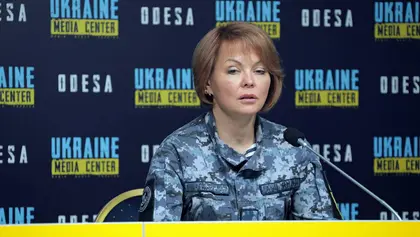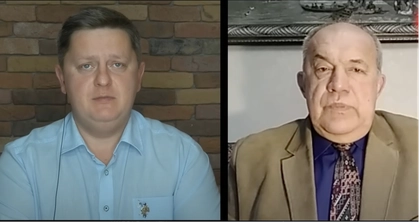Natalia Humeniuk, head of the Center for Strategic Communications in Ukraine’s Southern Defense Forces, was dismissed on Friday.
The General Staff of the Armed Forces of Ukraine (AFU) announced her dismissal on Facebook on Friday, April 19. According to Ukrinform, Dmytro Pletenchuk, spokesperson for the Ukrainian Navy, will replace Humeniuk starting today, April 22.
JOIN US ON TELEGRAM
Follow our coverage of the war on the @Kyivpost_official.
Humeniuk’s removal was demanded by local and foreign journalists who accused her of hindering local media coverage. Her jurisdiction covered the Kherson and Mykolaiv regions.
In one instance, journalists reportedly had to drive through minefields to document Russian war crimes due to the restrictions imposed by the former spokesperson.
Following her dismissal, Humeniuk simply posted a picture that said “And the sun is still stronger than the clouds…” on Facebook without further elaboration.

Journalists’ call for Humeniuk’s dismissal
On April 16, local and foreign journalists published an official statement on Ukrainian outlet Detektor Media that called on the military command to “replace Natalia Humeniuk with a more competent person and prevent her from any management of communications.”

Holiday Spirit Thrives Among Ukrainians Despite War, Study Finds
The statement was addressed to the Armed Forces of Ukraine’s (AFU) Commander-in-Chief Oleksandr Syrskyi, Minister of Defense Rustem Umerov and Chief of the General Staff Major General Anatoliy Barhylevych.
In the statement, journalists accused Humeniuk of unreasonable restrictions that severely hindered media coverage, where in most cases they were only able to document Russian war crimes by “bypassing the restrictions established in the area under Ms. Humeniuk’s command.”
The statement added: “The most popular word in the communications department of the Southern Defense Forces is ‘forbidden’.”
Areas that journalists claimed to be banned from entering included flood affected territory following the destruction of the Kakhovka dam in June 2023, which effectively allowed the proliferation of Russian narratives.
The ban also made their job more dangerous, the journalists said.
“Journalists had to drive through minefields to newly liberated villages in the Kherson region and Mykolaiv region, in order to report on war crimes of the Russians at the moment when the world was most curious.”
“It was impossible to obtain official permission to enter these villages legally by road,” the announcement read, adding that reporting in the Kherson region under Humeniuk’s command had led to uneven coverage of the war in different sectors.
In response to the call for her dismissal, Humeniuk told Radio Liberty that there was a lack of evidence to support their claims.
“More than 800 requests were processed within one week in a simplified manner… taking into account the security of operations,” Humeniuk said.
In the final point of the official statement, the journalists appealed to Ukraine’s military command to “make an effort” so that they do not have to “write another letter” in the event of similar situations.
“Persons in key communications positions must have the appropriate skills and reputation to perform their duties in accordance with the requirements of the times, especially in wartime,” it read.
You can also highlight the text and press Ctrl + Enter






